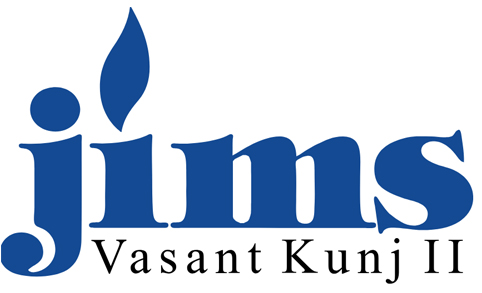Artificial Intelligence (AI) is no longer a concept of the future—it’s a powerful tool actively reshaping industries and redefining how we live and work. From smart assistants like Siri to AI chatbots, autonomous vehicles, and advanced healthcare diagnostics, AI is impacting every field. This rapid transformation naturally leads to a crucial question:
Is AI replacing human jobs, or is it redefining them?
For students pursuing a Bachelor of Computer Applications (BCA) at JIMS (Jagannath Institute of Management Sciences), understanding the role of AI in the job market is more than academic—it’s essential for preparing for future careers. As tomorrow’s tech professionals, BCA students must be ready not just to adapt to AI, but to lead its development, integration, and ethical use.
Jobs AI Is Replacing
AI is especially efficient at automating structured, repetitive, and rule-based tasks. Industries that rely on such tasks—like manufacturing, logistics, and customer service—are experiencing a shift:
- Manufacturing: Robots now handle repetitive tasks like assembling, packaging, and quality checking, once performed manually.
- Customer Support: AI-powered chatbots are replacing basic customer service roles, answering queries instantly and efficiently.
- Data Entry & Basic Bookkeeping: Automated software can now manage data with speed and precision, reducing the demand for manual entry jobs.
While these changes can displace certain roles, AI is more likely to replace tasks, not entire jobs. Understanding how to work alongside AI will be crucial in every sector.
Jobs Being Redefined by AI
Rather than removing jobs entirely, AI is transforming them. In many professions, it is streamlining routine tasks so humans can focus on creativity, strategy, and innovation. For example:
- Healthcare: AI can scan X-rays and identify diseases quickly, assisting doctors—not replacing them. This allows medical professionals to spend more time on patient care.
- Education: AI tools personalize learning, but teachers still play a vital role in motivating and guiding students.
- Marketing & Business: AI analyzes customer behavior and automates digital campaigns, enabling marketing professionals to focus on strategy and creativity.
For BCA students at JIMS, this means that future roles may require both technical proficiency and human insight. As part of their curriculum, students learn not just how to use AI tools, but also how to design systems that enhance human potential.
Jobs Being Created by AI
While AI may be automating some tasks, it is also creating new careers—many of which did not exist a few years ago. Some of the fastest-growing job roles include:
- AI & Machine Learning Engineers
- Data Scientists
- AI Ethicists
- Prompt Engineers
- Automation Developers
- AI System Trainers
These roles require a mix of programming, data analytics, logic, and ethical understanding—all of which are covered in the BCA program at JIMS. Through practical projects, coding labs, and real-world applications, students at JIMS are prepared not only to fill these roles but also to innovate within them.
Moreover, fields like cybersecurity, healthtech, fintech, and edtech are expanding rapidly thanks to AI. This opens more doors for BCA graduates trained to work at the intersection of AI and industry needs.
The Human Advantage
Despite all that AI can do, there are still crucial areas where human intelligence remains unmatched:
- Emotional Intelligence: AI lacks empathy. Jobs in healthcare, teaching, human resources, and counseling still rely on human compassion and emotional understanding.
- Creativity & Innovation: While AI can mimic patterns, it cannot originate new ideas the way human artists, designers, or entrepreneurs can.
- Ethical Decision-Making: AI follows rules—it doesn’t understand the moral implications of its actions. Human oversight is essential in fields involving fairness, privacy, and ethics.
At JIMS, students are encouraged to combine technical knowledge with ethical awareness, teamwork, and creativity. These skills are what make BCA graduates not just employable, but future-ready.
Adapting to the Future of Work
For BCA students, the question is not whether AI will affect their careers—it’s how. Preparing for an AI-influenced job market means developing a mindset of lifelong learning. Key areas to focus on include:
- Coding and Software Development
- AI & Machine Learning Fundamentals
- Problem-Solving and Logical Thinking
- Data Analysis and Visualization
- Ethical Reasoning
- Communication and Collaboration
JIMS ensures that students are exposed to all of these areas through workshops, industry seminars, hackathons, internships, and hands-on projects. This holistic approach ensures that BCA graduates can thrive in careers where AI is a partner, not a threat.
Conclusion
So, is AI replacing human jobs or redefining them? The answer is clear: both. While AI may automate routine tasks, the broader trend is toward transformation—and even creation—of jobs. For BCA students at JIMS, this is an opportunity to shape the future, not just survive it.
The real advantage will belong to those who understand both the power and the limits of AI, and who can apply human intelligence, creativity, and ethics in a tech-driven world.
At JIMS, students are not just learning about AI—they’re being trained to lead in an AI-powered future. Because the future of work isn’t about humans vs. AI. It’s about humans working with AI to create a better, smarter world.
Dr. Poonam Malik
Assistant Professor
Bachelor of Computer Application

Good explanation.
Informative and well explained
Very interesting
Thought-provoking blog—offers a balanced view on how AI is reshaping roles rather than just replacing them.